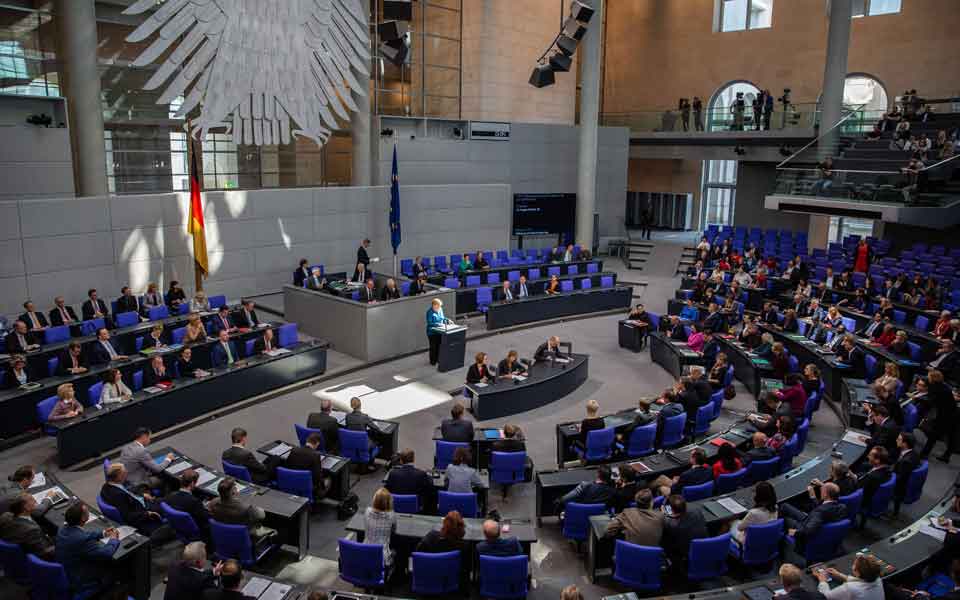German parties split over latest Greek reform plans

The parties in Angela Merkel's coalition government sent conflicting signals on the latest reform proposals from Greece on Friday, underscoring the challenge for the German chancellor before a pivotal summit of EU leaders this weekend.
Leading Social Democrats (SPD) welcomed concessions from Greek Prime Minister Alexis Tsipras on taxes, pensions, defence spending and privatisation, saying the measures showed his government was finally getting serious about reform.
“This is a very important step forwards, though it could have been taken long ago,” Axel Schaefer, a top SPD member of parliament, told Reuters, urging an end to talk of a Greek exit from the eurozone, which he said would be “lunacy”.
But lawmakers in Merkel's conservative bloc, many of whom are under pressure from constituents to cut Greece loose, questioned whether Tsipras could be trusted to enact reforms that he has long opposed and which Greeks overwhelmingly rejected in a referendum less than a week ago.
“How believable is it that this reform list will be implemented?” said Ralph Brinkhaus, deputy parliamentary floor leader for Merkel's conservatives.
Hans-Peter Friedrich, a former minister under Merkel and a senior figure in the Bavarian Christian Social Union (CSU), told Deutschlandfunk radio: “Either the Greek government is tricking its own people or (it is tricking) us again.”
According to sources close to Merkel, she remains determined to clinch a deal with Greece and avert a so-called “Grexit” which could badly tarnish Europe's image and her own legacy.
But cognizant of the deep scepticism in her conservative ranks and worried that Tsipras may not deliver on his promises, she has signalled that she will not do a deal at any price.
At a government news conference on Friday, her spokesman Steffen Seibert was guarded about the new Greek reform plans, declining to comment on them in detail, and making clear that Merkel could only go to the Bundestag lower house of parliament with a third bailout package for Athens if she was convinced Greece was serious about reforms.
Under the Greek plan, Tsipras has asked for 53.5 billion euros ($59.47 billion) from euro zone partners to help cover Greece's debts until 2018.
In exchange, Athens has agreed to phase out tax breaks for its islands, hike taxes on shipping companies, cut defence spending and set a firm timetable for privatising state assets like Piraeus port and regional airports.
Hard bargain
Merkel faces a delicate balancing act over the coming days.
She must push a hard bargain with Tsipras to ensure the backing of Schaeuble and other conservatives at home, but if she pushes too hard and a deal with Greece collapses she is likely to be blamed for causing a “Grexit” and the financial, economic and humanitarian chaos that could come with it.
Failure to clinch a deal could also expose cracks in the broader European edifice.
French President Francois Hollande, who welcomed the latest Greek proposals as “credible and serious”, has lobbied harder for a deal than Merkel, raising questions about how united Berlin and Paris truly are on the Greek question.
Were European leaders to back negotiations on a third bailout package for Greece at a summit in Brussels on Sunday, the Bundestag would have to vote, most likely on Wednesday, before talks could start.
A green light from the German parliament is probably not in doubt due to support from the SPD and opposition Greens. But if Merkel failed to get a majority of her conservatives behind her, it would represent a humiliating setback for the chancellor.
In the last Bundestag vote on a Greek bailout extension in February, a record 29 conservative lawmakers rebelled, while another 109 signed statements saying they had voted for the extension with reservations.
Eckhardt Rehberg, a budget expert for Merkel's Christian Democrats (CDU), told Reuters that constituents in his electoral district in the eastern state of Mecklenburg-Vorpommern were overwhelmingly against further aid for Greece.
“I can barely find anyone who still supports helping Greece,” he said. “Tsipras and (former finance minister Yanis) Varoufakis, have destroyed all trust. No one believes them anymore.”
[Reuters]





